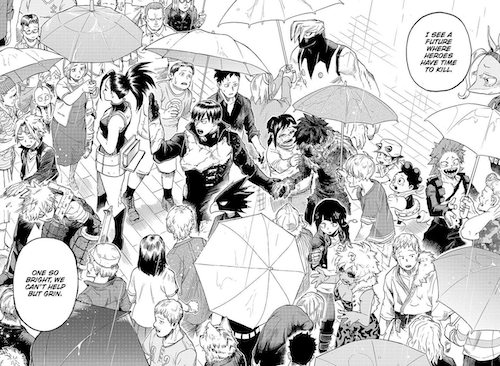 |
| You can see the bigger picture, find out what it’s all about. |
“Once upon a time, the unmatched All Might showed us all how to be a hero. He was the act to follow, and everyone cheered him on! But along the way people forgot about the heart and soul that made the man.” A long time ago, a quirkless boy named Yagi Toshinori took the first steps on what would come to be an arduous journey of creating the Symbol of Peace and wearing its mantle, All Might. In return, he closed his heart and distanced himself, not only from society but also from his peers. However, for us readers he also takes on a different role. He becomes the one who shows us how an ideal by itself is not realistically sustainable. All Might, with all his might and power, eventually becomes weak, feeble. Don’t get me wrong, Heroaca is a story about idealism, and how its characters aim toward it. Personal accountability: that’s how they do it. Through developing deep, personal values a story is told about idealism in juxtaposition with a variety of themes—most notably the human heart in conflict with itself. William Faulkner once said this conflict alone can make a good story, because it’s the only thing worth writing about. Sure, superpowers, heroes and villains are cool ideas; same as giant mechas who synchronize with your brain or a world of elves, dwarfs and hobbitses. But what pulls me into the world of Heroaca is what I enjoy the most in fiction: it replicates human experience in a fantastical world.
 |
| The day that you stop running is the day that you arrive. |
Horikoshi took the most unusual route in shounen. He called forth the audience; he involved the civilians in his narrative, to account for themselves, the role they play in the bigger picture, and their impact on society. We read Mr. Stars’ questions across the screen, and the truth is that it serves as a mirror. It prompts us to ask, what makes us take a backseat in our own lives? Why do we play passive spectators? How are we taken over by our emotional reactions and cease to listen to one another? In my experience, the answer is simple: it all comes down to fear of being unsafe, defective (a bad person), or alone. The stories we carry are defenses against what we expect will harm us [again], or against whatever might cause us to confront these fears. It’s easy for us to side with Deku and say “the civilians are being unreasonable, they should’ve let him in at the beginning!” because our emotional connection with the heroes has long since been established. But what about our own lives? Suddenly there’s a list of reasons why you didn’t say what you wanted to say, didn’t do the thing, or can’t stop yourself from pulling up your phone while you wait for the bus. The truth is, most of us spend way too much time looking forward and not enough time looking inwards. We can’t create a proper system of communal support if we don’t.

That was a touching review, Gabie, and very very true.
I often wonder, how would I react if put in a position to save someone at the risk of my own life. Would my feet act on their own or freeze to the ground?
Our Country is so divided right now, it is sad. (Wear a mask…don’t wear a mask… get vaccinated….don’t get vaccinated…. de-fund the police, who risk their lives daily….. just because of a few bad cops.) It seems that the squeaky wheel gets the oil while the rest of us sit back, complain, but do nothing. I would love to see that “proper system of communal support” you mentioned…. soon.
Thanks for the review.
You’re actually the first person (at least on Heroaca manga posts) to make a connection with the themes being addressed in the series and our current worldwide situation. So I wanted to acknowledge that, because I thought it was pretty cool of you to do so.
Like the characters in the series, we can see that it’s these types of situations that offer opportunities for us to test ourselves and how we respond to moments of crisis, if we can stand up straight underneath pressure. When people are divided and confused, that might as well be a window to test our integrities. For me, it’s a constant practice to reframe a disheartening situation into a challenge, one that I’m glad to diligently undergo. Otherwise I really feel like giving up, or shutting myself off completely (and I’m already an introvert with very few friends ha ha).
I really liked what Horikoshi did with Lady Nagant’s character, because she showed Deku that society is not as black and white as the main narrative likes to pretend it is. In all areas, niches, places and communities there many voices speaking. I believe proper systems of communal support are a possibility on a micro scale. Personal accountability and self-development are the steps I take so I can contribute my civic value. I practice critical thinking, logic, reason. I research, listen and try to find my own voice amidst all this craziness.
I’m very happy to hear you enjoyed the review and thank you so much for sharing your thoughts with me! Have a lovely day :3
Great commentary which gets to the heart of what it’s about. Big fan of that Faulkner quote too.
Big fan of that Faulkner quote too.
I’m glad to hear that, thank you Dude. Faulkner’s entire Nobel Prize speech is a real treat!